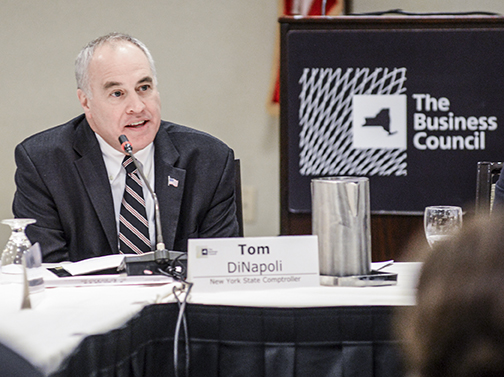State’s $211M ad campaign makes comptroller a mad man

A high profile $211 million local business and tourism advertising campaign championed by Gov. Andrew Cuomo lacks the performance measures needed to determine if the spending has been a wise decision, according to an audit released today by New York State Comptroller Thomas DiNapoli.
Run through the state’s Empire State Development Corporation, the ad campaign — which has included the Start-Up NY and Taste NY initiatives, among others — “has no parameters in place to guide how much it should spend on marketing to achieve any specific outcome,” according to the audit.
The comptroller’s examination reviewed the campaign — which has cost about $40 million per year over the past five years — from late 2011 through November of last year.
The advertising included out-of-state ads aimed at drawing businesses to New York, an “Open for Business” campaign in the wake of Hurricane Sandy and a Taste NY promotion touting the state’s food and beverage producers, among other efforts.
Its purpose was “to create a campaign that will position New York State favorably in the global marketplace to spur investment, job creation and income generation in New York’s economic rebuilding process.”
However, because no clear goals or ways to measure progress toward those goals were laid out, it’s not clear if the campaign — run largely by advertising giant BBDO — has been a success, according to the comptroller.
“When government spends hundreds of millions of taxpayer dollars to send a message that New York is a place to visit and open for business, it should have clear objectives and show the public actual results,” Mr. DiNapoli said in a statement. “ESDC’s attempts to measure the results of this advertising campaign were weak at best, leaving real questions about whether the results justify the cost.”
In a written response to the audit, the ESD took issue with the criticism, pointing to increased web traffic, polling that indicates more interest in New York’s businesses and improved perception of the state as a place to do business.
“Advertising cannot close a deal or change general economic circumstances that impact corporate job creation,” the response states. “What ESD’s marketing efforts can accomplish is to create interest and openness on the part of business owners to do business in New York. Our business development marketing is driving website traffic, changing perceptions, increasing consideration and helping generate leads. These are the only metrics appropriate to evaluate our effectiveness and on these metrics we have succeeded.”
Steve Bate, president with the Long Island Wine Council, said that on the local level he “thinks it has definitely been helpful. Whether that is translating into hard sales is probably difficult to determine.”
But, he said, “The fact that we have a governor behind locally-grown food and beverages has been a huge boon to the industries.”
In addition to advertising dollars, legislative changes proposed by Gov. Cuomo have corresponded with the promotional efforts. For example, Start-Up NY comprises tax-free zones for new businesses throughout the state, and legislation creating “farm breweries” in the state was signed into law.
The comptroller questioned whether or not website traffic and polling were positive indicators of whether or not the $211 million has been a good investment, and also questioned the validity of the polls that indicated a positive view of New York had, in fact, occurred during the campaign.
ESD hired East Rutherford-based Russell Research to conduct polling on its behalf. The firm found that in October 2014, compared with one year prior, 55 percent of business executives found that New York was an excellent or very good place to do business, compared with 34 percent in October of 2013.
But the ad campaign has drawn criticism from political opponents of Gov. Cuomo, who have questioned its effectiveness. While close to 2,100 jobs have been promised by businesses opting into the Start-Up NY campaign, only 72 jobs had been created by the end of 2014, according to the ESD’s year-end report.
So, opponents say, there isn’t all that much to boast — or advertise — about.
“The only way for us to really encourage businesses to come to New York, and specifically Long Island, is to create a more business-friendly climate,” said Assemblyman Anthony Palumbo (R-New Suffolk). Mr. Palumbo pointed to the unpopular Metropolitan Transit Authority’s payroll tax, which taxes businesses with over 25 employees despite the paltry service offered on the East End of Long Island.
“There are so many burdensome regulations on businesses that unfortunately, no wants to deal with it,” he said.
READ THE AUDIT BELOW:








